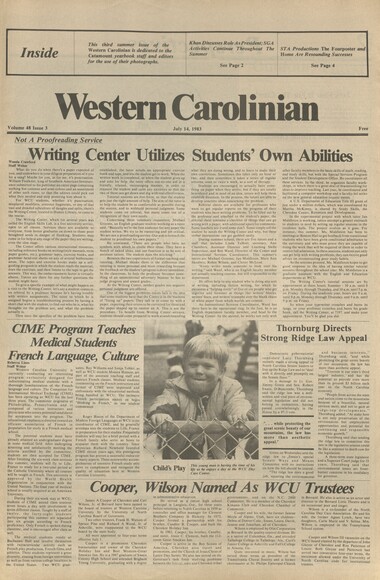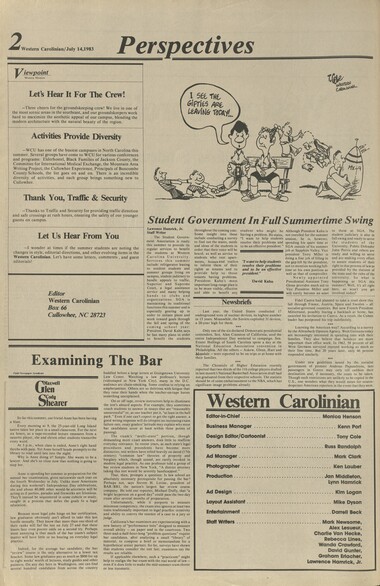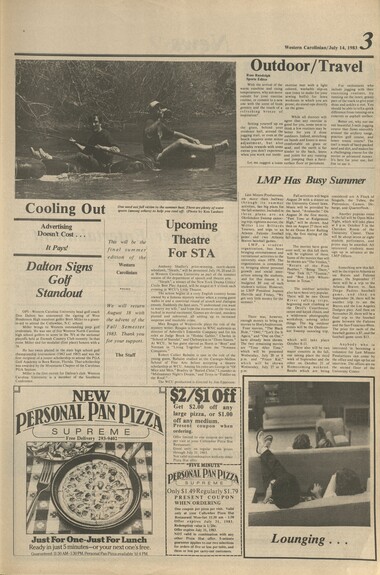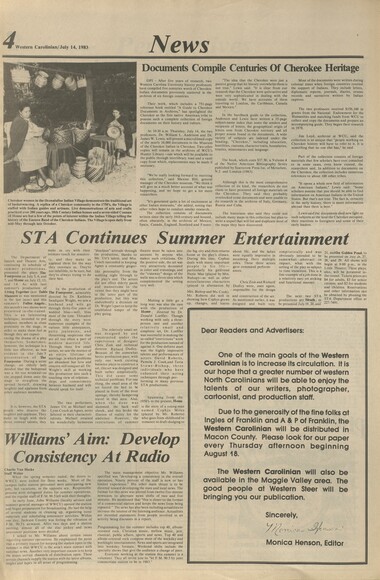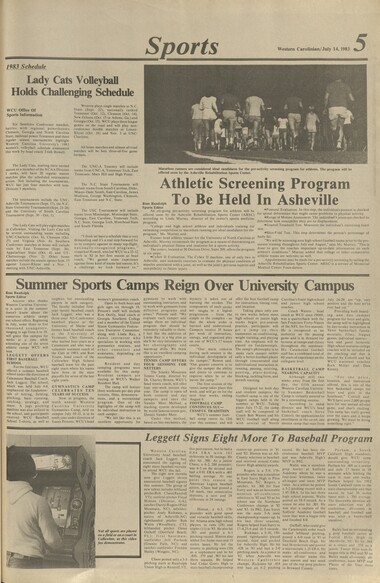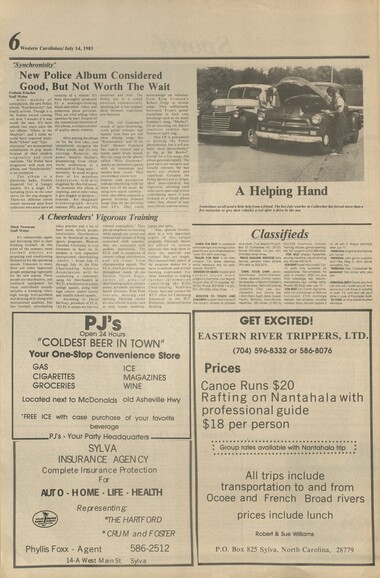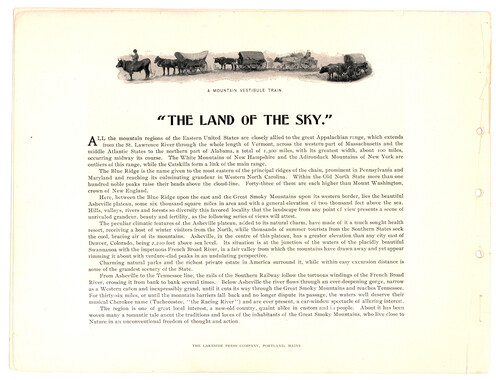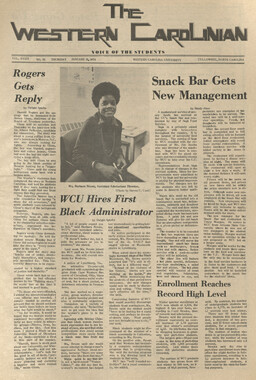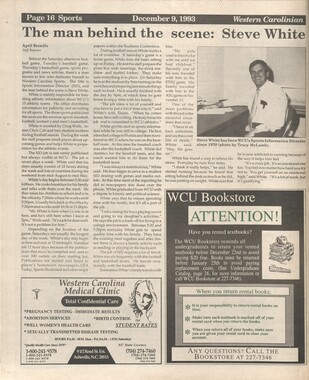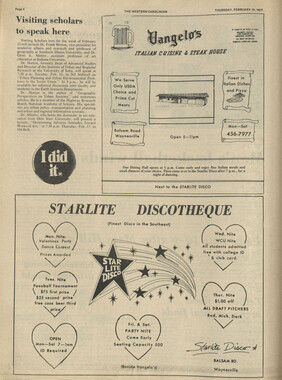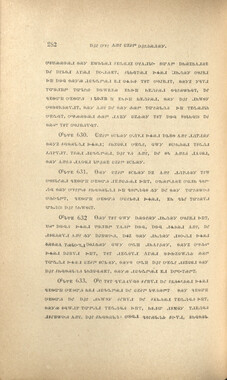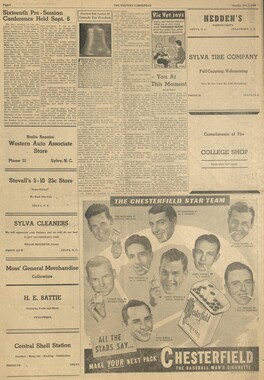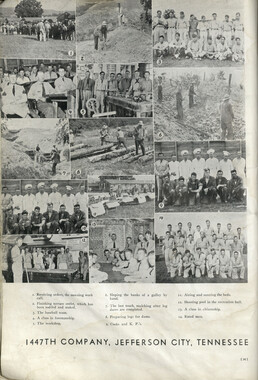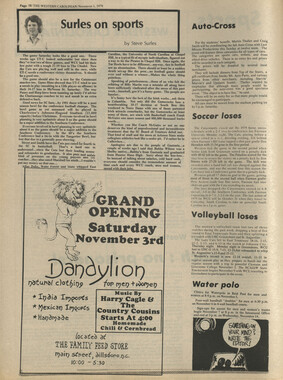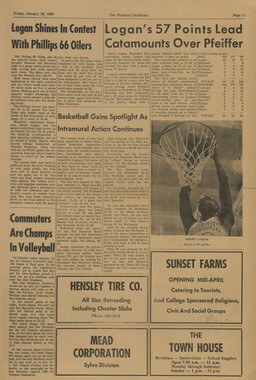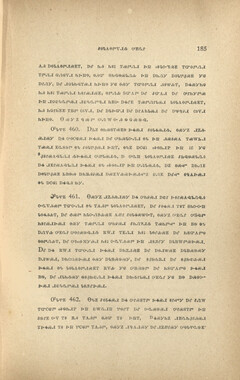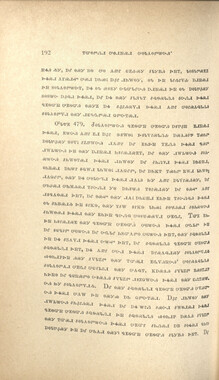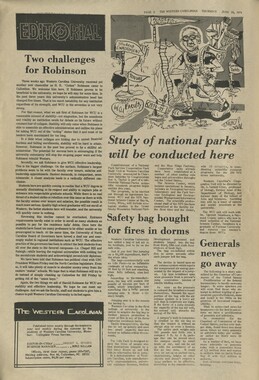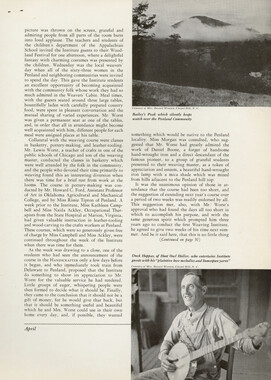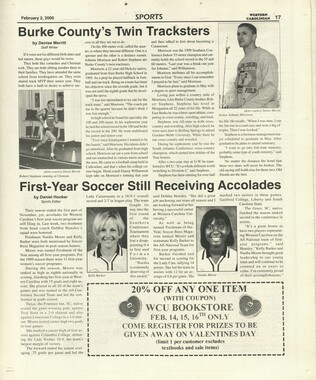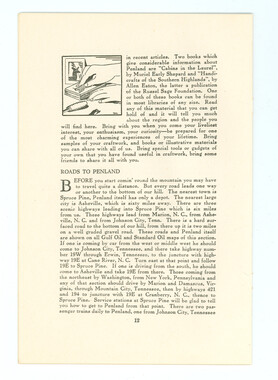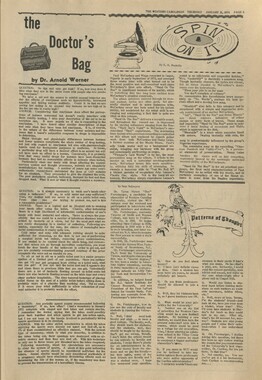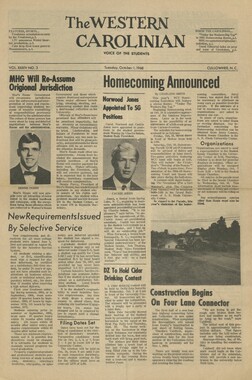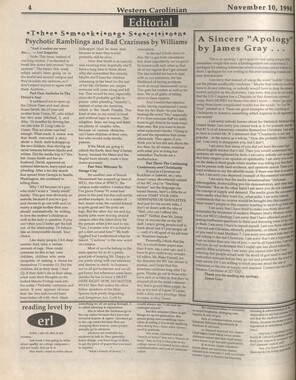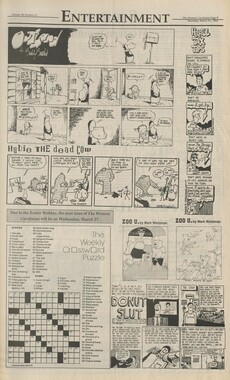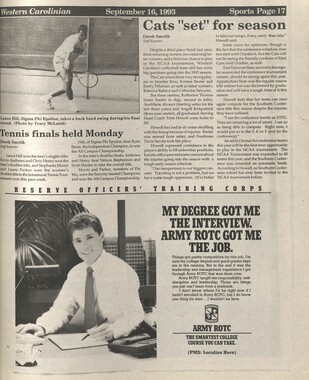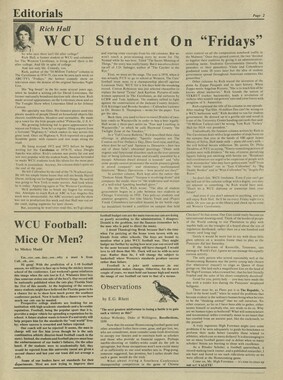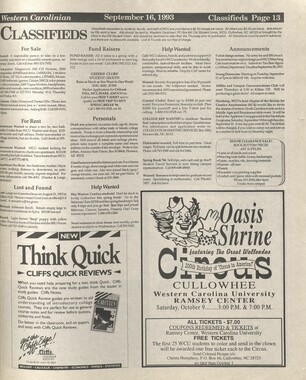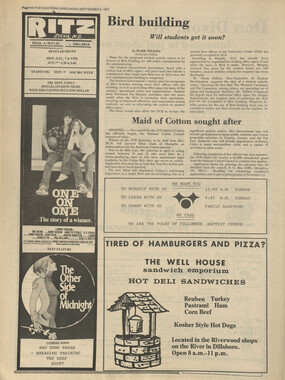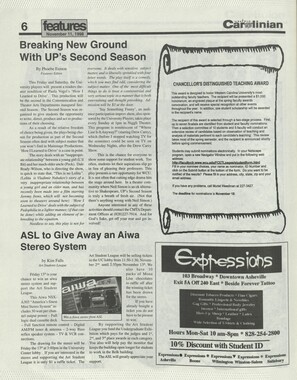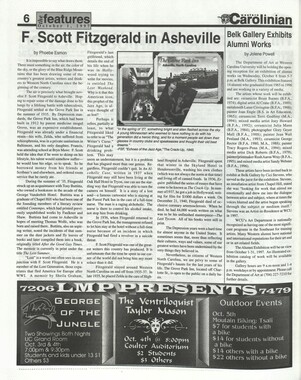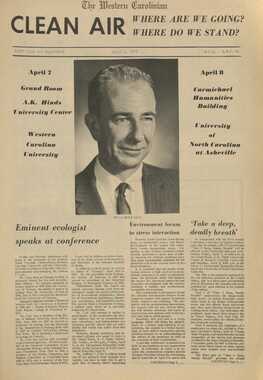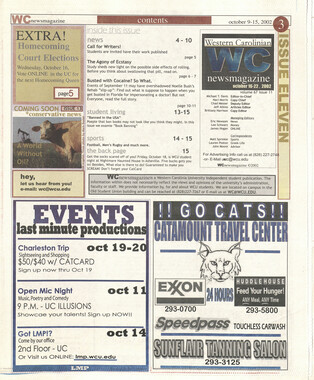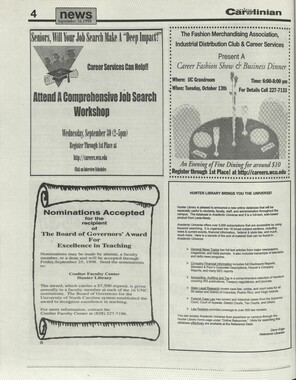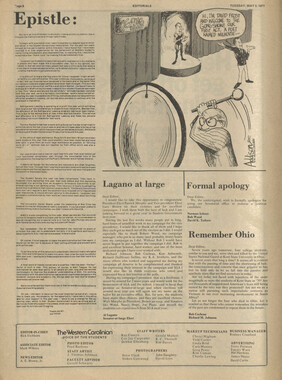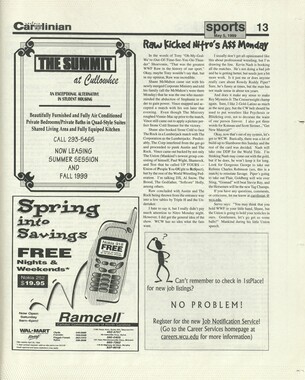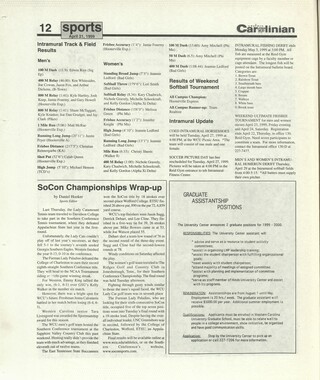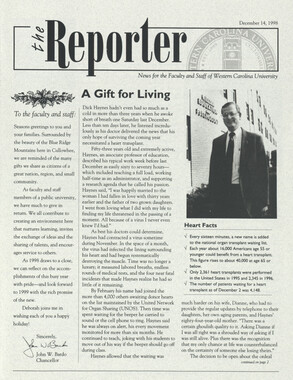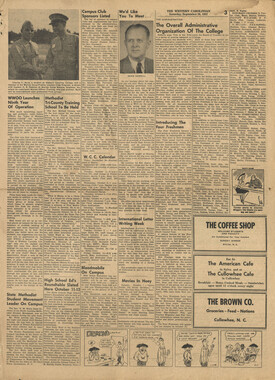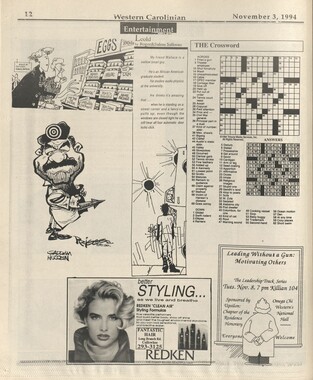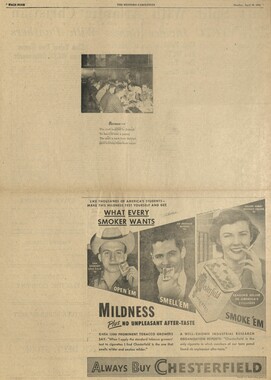Western Carolina University (20)
View all
- Canton Champion Fibre Company (2308)
- Cherokee Traditions (293)
- Civil War in Southern Appalachia (165)
- Craft Revival (1942)
- Great Smoky Mountains - A Park for America (2683)
- Highlights from Western Carolina University (430)
- Horace Kephart (941)
- Journeys Through Jackson (154)
- LGBTQIA+ Archive of Jackson County (15)
- Oral Histories of Western North Carolina (314)
- Picturing Appalachia (6679)
- Stories of Mountain Folk (413)
- Travel Western North Carolina (160)
- Western Carolina University Fine Art Museum Vitreograph Collection (129)
- Western Carolina University Herbarium (92)
- Western Carolina University: Making Memories (708)
- Western Carolina University Publications (2283)
- Western Carolina University Restricted Electronic Theses and Dissertations (146)
- Western North Carolina Regional Maps (71)
- World War II in Southern Appalachia (131)
University of North Carolina Asheville (6)
View all
- Allanstand Cottage Industries (62)
- Appalachian National Park Association (53)
- Bennett, Kelly, 1890-1974 (1295)
- Berry, Walter (76)
- Brasstown Carvers (40)
- Carver, George Washington, 1864?-1943 (26)
- Cathey, Joseph, 1803-1874 (1)
- Champion Fibre Company (233)
- Champion Paper and Fibre Company (297)
- Cherokee Indian Fair Association (16)
- Cherokee Language Program (22)
- Crowe, Amanda (40)
- Edmonston, Thomas Benton, 1842-1907 (7)
- Ensley, A. L. (Abraham Lincoln), 1865-1948 (275)
- Fromer, Irving Rhodes, 1913-1994 (70)
- George Butz (BFS 1907) (46)
- Goodrich, Frances Louisa (120)
- Grant, George Alexander, 1891-1964 (96)
- Heard, Marian Gladys (60)
- Kephart, Calvin, 1883-1969 (15)
- Kephart, Horace, 1862-1931 (313)
- Kephart, Laura, 1862-1954 (39)
- Laney, Gideon Thomas, 1889-1976 (439)
- Masa, George, 1881-1933 (61)
- McElhinney, William Julian, 1896-1953 (44)
- Niggli, Josephina, 1910-1983 (10)
- North Carolina Park Commission (105)
- Osborne, Kezia Stradley (9)
- Owens, Samuel Robert, 1918-1995 (11)
- Penland Weavers and Potters (36)
- Roberts, Vivienne (15)
- Roth, Albert, 1890-1974 (142)
- Schenck, Carl Alwin, 1868-1955 (1)
- Sherrill's Photography Studio (2565)
- Southern Highland Handicraft Guild (127)
- Southern Highlanders, Inc. (71)
- Stalcup, Jesse Bryson (46)
- Stearns, I. K. (213)
- Thompson, James Edward, 1880-1976 (226)
- United States. Indian Arts and Crafts Board (130)
- USFS (683)
- Vance, Zebulon Baird, 1830-1894 (1)
- Weaver, Zebulon, 1872-1948 (58)
- Western Carolina College (230)
- Western Carolina Teachers College (282)
- Western Carolina University (1794)
- Western Carolina University. Mountain Heritage Center (18)
- Whitman, Walt, 1819-1892 (10)
- Wilburn, Hiram Coleman, 1880-1967 (73)
- Williams, Isadora (3)
- Cain, Doreyl Ammons (0)
- Crittenden, Lorraine (0)
- Rhodes, Judy (0)
- Smith, Edward Clark (0)
- Appalachian Region, Southern (2393)
- Asheville (N.C.) (1886)
- Avery County (N.C.) (26)
- Blount County (Tenn.) (147)
- Buncombe County (N.C.) (1664)
- Cherokee County (N.C.) (283)
- Clay County (N.C.) (555)
- Graham County (N.C.) (233)
- Great Smoky Mountains National Park (N.C. and Tenn.) (478)
- Haywood County (N.C.) (3522)
- Henderson County (N.C.) (70)
- Jackson County (N.C.) (4692)
- Knox County (Tenn.) (21)
- Knoxville (Tenn.) (9)
- Lake Santeetlah (N.C.) (10)
- Macon County (N.C.) (420)
- Madison County (N.C.) (211)
- McDowell County (N.C.) (39)
- Mitchell County (N.C.) (132)
- Polk County (N.C.) (35)
- Qualla Boundary (981)
- Rutherford County (N.C.) (76)
- Swain County (N.C.) (2017)
- Transylvania County (N.C.) (247)
- Watauga County (N.C.) (12)
- Waynesville (N.C.) (68)
- Yancey County (N.C.) (72)
- Aerial Photographs (3)
- Aerial Views (60)
- Albums (books) (4)
- Articles (1)
- Artifacts (object Genre) (228)
- Biography (general Genre) (2)
- Cards (information Artifacts) (38)
- Clippings (information Artifacts) (191)
- Crafts (art Genres) (622)
- Depictions (visual Works) (21)
- Design Drawings (1)
- Drawings (visual Works) (184)
- Envelopes (73)
- Facsimiles (reproductions) (1)
- Fiction (general Genre) (4)
- Financial Records (12)
- Fliers (printed Matter) (67)
- Glass Plate Negatives (381)
- Guidebooks (2)
- Internegatives (10)
- Interviews (811)
- Land Surveys (102)
- Letters (correspondence) (1013)
- Manuscripts (documents) (619)
- Maps (documents) (159)
- Memorandums (25)
- Minutes (administrative Records) (59)
- Negatives (photographs) (5651)
- Newsletters (1285)
- Newspapers (2)
- Occupation Currency (1)
- Paintings (visual Works) (1)
- Pen And Ink Drawings (1)
- Periodicals (193)
- Personal Narratives (7)
- Photographs (12982)
- Plans (maps) (1)
- Poetry (5)
- Portraits (1655)
- Postcards (329)
- Programs (documents) (151)
- Publications (documents) (2237)
- Questionnaires (65)
- Scrapbooks (282)
- Sheet Music (1)
- Slides (photographs) (402)
- Sound Recordings (796)
- Specimens (92)
- Speeches (documents) (15)
- Tintypes (photographs) (8)
- Transcripts (322)
- Video Recordings (physical Artifacts) (23)
- Vitreographs (129)
- Text Messages (0)
- A.L. Ensley Collection (275)
- Appalachian Industrial School Records (7)
- Appalachian National Park Association Records (336)
- Axley-Meroney Collection (2)
- Bayard Wootten Photograph Collection (20)
- Bethel Rural Community Organization Collection (7)
- Blumer Collection (5)
- C.W. Slagle Collection (20)
- Canton Area Historical Museum (2110)
- Carlos C. Campbell Collection (198)
- Cataloochee History Project (65)
- Cherokee Studies Collection (4)
- Daisy Dame Photograph Album (5)
- Daniel Boone VI Collection (1)
- Doris Ulmann Photograph Collection (112)
- Elizabeth H. Lasley Collection (1)
- Elizabeth Woolworth Szold Fleharty Collection (4)
- Frank Fry Collection (95)
- George Masa Collection (173)
- Gideon Laney Collection (452)
- Hazel Scarborough Collection (2)
- Hiram C. Wilburn Papers (28)
- Historic Photographs Collection (236)
- Horace Kephart Collection (861)
- Humbard Collection (33)
- Hunter and Weaver Families Collection (1)
- I. D. Blumenthal Collection (4)
- Isadora Williams Collection (4)
- Jesse Bryson Stalcup Collection (47)
- Jim Thompson Collection (224)
- John B. Battle Collection (7)
- John C. Campbell Folk School Records (80)
- John Parris Collection (6)
- Judaculla Rock project (2)
- Kelly Bennett Collection (1314)
- Love Family Papers (11)
- Major Wiley Parris Civil War Letters (3)
- Map Collection (12)
- McFee-Misemer Civil War Letters (34)
- Mountain Heritage Center Collection (4)
- Norburn - Robertson - Thomson Families Collection (44)
- Pauline Hood Collection (7)
- Pre-Guild Collection (2)
- Qualla Arts and Crafts Mutual Collection (12)
- R.A. Romanes Collection (681)
- Rosser H. Taylor Collection (1)
- Samuel Robert Owens Collection (94)
- Sara Madison Collection (144)
- Sherrill Studio Photo Collection (2558)
- Smoky Mountains Hiking Club Collection (616)
- Stories of Mountain Folk - Radio Programs (374)
- The Reporter, Western Carolina University (510)
- Venoy and Elizabeth Reed Collection (16)
- WCU Gender and Sexuality Oral History Project (32)
- WCU Mountain Heritage Center Oral Histories (25)
- WCU Oral History Collection - Mountain People, Mountain Lives (71)
- WCU Students Newspapers Collection (1744)
- Western North Carolina Tomorrow Black Oral History Project (69)
- William Williams Stringfield Collection (2)
- Zebulon Weaver Collection (109)
- African Americans (388)
- Appalachian Trail (32)
- Artisans (521)
- Cherokee art (84)
- Cherokee artists -- North Carolina (10)
- Cherokee language (21)
- Cherokee pottery (101)
- Cherokee women (208)
- Church buildings (166)
- Civilian Conservation Corps (U.S.) (110)
- College student newspapers and periodicals (1830)
- Dams (94)
- Dance (1023)
- Education (222)
- Floods (60)
- Folk music (1015)
- Forced removal, 1813-1903 (2)
- Forest conservation (220)
- Forests and forestry (917)
- Gender nonconformity (4)
- Great Smoky Mountains National Park (N.C. and Tenn.) (154)
- Hunting (38)
- Landscape photography (10)
- Logging (103)
- Maps (84)
- Mines and mineral resources (8)
- North Carolina -- Maps (18)
- Paper industry (38)
- Postcards (255)
- Pottery (135)
- Railroad trains (69)
- Rural electrification -- North Carolina, Western (3)
- School integration -- Southern States (2)
- Segregation -- North Carolina, Western (5)
- Slavery (5)
- Sports (452)
- Storytelling (245)
- Waterfalls -- Great Smoky Mountains (N.C. and Tenn.) (66)
- Weaving -- Appalachian Region, Southern (280)
- Wood-carving -- Appalachian Region, Southern (328)
- World War, 1939-1945 (173)
Western Carolinian Volume 48 Number 03
Item
Item’s are ‘child’ level descriptions to ‘parent’ objects, (e.g. one page of a whole book).
-
-
Inside This third summer issue of the Western Carolinian is dedicated to the Catamount yearbook staff and editors for the use of their photographs. Khan Discusses Role As President; SGA Activities Continue Throughout The Summer See Page 2 STA Productions The Fourposter and Home Are Resounding Successes Western Carolinian Volume 48 Issue 3 July 14, 1983 Free Not A Proofreading Service Writing Center Utilizes Students' Own Abilities Wanda Crawford Staff Writer What do you do when there's a paper expected of you, and somewhere in your diligent preparation of it you hit a snag? Maybe for you, as for me, it's punctuation. William Faulkner, king of Southern American literature, once submitted to his publisher an entire page containing nothing but commas and semi-colons and an assortment of other such runes, so that the editors could pick out what they needed and stop pestering him about it. For WCU students, whether it's punctuation, misplaced modifiers, sentence fragments, or any of that vast and dreaded subculture of dangles and splits, there's the Writing Center, located in Hunter Library, to come to the rescue. The Writing Center, which for several years was called the English Skills Lab, is a free university service, open to all classes. Services there are available to everyone, from honor graduates on down to those poor benighted souls in danger of flunking. Students may come in for help at any stage of the paper they are writing, even the idea stage. The Center offers various instructional resources, including reference books on writing (style manuals, term paper guides, etc.), grammar tapes, exercise books, and grammar hand-out sheets on any of several bothersome areas. The tapes and exercise books make up a self- guiding program in which the student reads the material, does the exercises, and then listens to the tape to get the answers. This way, the embarrassment factor is virtually absent. Tutors are there for any further questions the student might have. To give a specific example of what might happen on a visit to the Writing Center, let's say a student comes in on referral by a professor because he's having trouble with written assignments. The tutor to which he is assigned begins a troubleshooting process by having a short chat with the student, to find out who he is, what his thoughts on the problem are, and what the problem actually is. Then once the specifics of the problem have been established, the tutor selects an appropriate exercise book and tape, and lets the student get to work. When the written work is completed, or when the student gives up and asks for help, the tutor offers one-to-one aid in a friendly, relaxed, encouraging manner, in order to reassure the student and calm any anxieties so that the two of them can get down and dig with real effectiveness. Tutorial sessions are free-form, so that the student gets just the right amount of help. The aim of the tutor is to help the student be as comfortable as possible during the session, and to withhold personal judgment. Some students come on referral, but many come out of a recognition of their own needs. Concerning these voluntary requestors, Michael Grooms, an English graduate student working as a tutor said, "Basically we're the first audience for any paper the student writes. We try to be reassuring and yet critical. We are not a proofreading service. Our aim is to teach the student to proofread his own papers." He continued, "There are people who have no symbols with which to clothe their ideas. They have a bunch of naked ideas, and our function is to be sort of assistant tailors. The student does the stitching." Between the two experiences of formal teaching and tutoring, Michael thinks there is the difference that tutoring is more personal and more rewarding because the feedback on the student's progress is more immediate. In the classroom, he feels the professor becomes something of an unintentional adversary because he has to judge progress and award grades. At the Writing Center, neither grades nor negative personal judgment are offered. One of the biggest problems tutors face is the idea that some students have that the Center is in the business of "fixing up" papers. They call in or come by with a paper, expecting their errors to be corrected for them and the paper shaped up to receive an A. This is not the procedure. To benefit from Writing Center services, students should come prepared to work at understanding what they are doing wrong, and to learn to make their own corrections. Sometimes this takes only an hour or two, and then sometimes it takes a series of regular sessions, once or twice a week, as a sort of therapy. Students are encouraged to actually have something on paper when they arrive, but if they are totally bewildered and in need of an idea, tutors will help them establish direction. In the process, the tutors are able to develop concrete ideas concerning the problem. Referral sheets are available for professors who want to get regular reports on the progress of their students who have writing problems. To be filled out by the professor and attached to the student's paper, the referral sheet contains a checklist of things that can go wrong with a paper, with additional space for comments. Some teachers use it and some don't. Some simply tell the student he needs the Writing Center and why, but these verbal instructions can get garbled easily. During summer school, there are five tutors and a staff that includes Linda Talbott, secretary, Ann Chambers, Assistant Director and Learning Skills Supervisor, and Ben Ward, Director of the Center and Instructional Services Coordinator. This summer's tutors are Michael Grooms, Jan Middleton. Mary Ann Skodney, Robin Wilson, and Clover McLeod. "Every writer needs someone to look over his writing," said Ward, who is an English faculty member not actually teaching courses, but still responsible to the department. He offers help to any student who is doing any sort of writing, including fiction writing, for which he envisions a "helping circle" of five or six people who get together and hammer at things like writers' blocks, writers' fears, and writers' triumphs over the blank chaos of white paper from which worlds are created. As Instructional Services Coordinator, Ward has three hats in the operational ring. In the first, he is an English department faculty member, and head fo the Writing Center. In the second, he works not only with other faculty members in the basic skills of math, reading, and study skills, but with the Special Services Program and the Student Development Office. He coordinates all these services. In the third, he organizes faculty workshops, in which there is a great deal ol brainstorming tor ideas to improve teaching. Last year, he coordinated and facilitated a computer workshop and a faculty-led series on the new general education require ments. A U.S. Department of Education Title III grant of just under a million dollars, which was coordinated by Martha McKinny, is shared by Study Skills, the Cherokee Center, Retention and Development. In the experimental project with which tutor Jan Middleton is working, tutors attempt a greater outreach to students in need by setting up regular sessions in the residence halls. The project evolves as it goes. For instance, this summer, Ms. Middleton has been to meetings at Benton Hall to get feedback from transitional students who have been given conditional admittance to the university and who must prove they are capable of doing the work that will be required of them in order to receive full admission. In these sessions, students not only can get help with writing problems, they can receive good advice on reconstructing poor study habits. As the sessions proceed, Ms. Middleton hopes to get good response to the idea of having similar tutorial sessions throughout the school year. Ms. Middleton is a graduate assistant with the English and Education departments at WCU. The Writing Center's tutorial sessions are by appointment at these hours: Summer - 10 a.m. until 8 p.m. Monday through Thursday, and 10 a.m. until 5 p.m. on \Friday. During the academic year, hours are 9 a.m. until 9 p.m. Monday through Thursday, and 9 a.m. until 5 p.m. on Friday. So when your typewriter crouches and bares its fangs, or your professor crouches and bares his grade book, call the Writing Center, at 7197, and make your appointment. You'll be glad you did. CIME Program Teaches Medical Students French Language, Culture Rebecca Lines Staff Writer Western Carolina University is currently conducting an interesting program exclusively designed for indoctrinating medical students with a thorough familiarization of the French language and culture. The Committee for International Medical Exchange (CIME) has been operating at WCU for the last three years. The committee originates at Philadelphia, Pennsylvania and is composed of various instructors and physicians who screen potential candidates for acceptance into the program. The educational emphasis is directed toward an efficient assimilation of French in preparation for study in a French medical school. The potential students must have already attained an undergraduate degree in some medical field. After undergoing screening and satisfactorily meeting the criteria ascribed by the committee, students are then accepted for CIME. After finishing the six-week class sessions this summer, students will fly to Lille, France to study for a two-year period at the Catholic University where all courses will be taught in French. This university is approved by the World Health Organization in conjunction with the United Nations. The final year of medical school is usually acquired at an American University. During their six-week stay at WCU, students of CIME attend class sessions seven hours a day with involvement in seven different classes. Taught by a staff of twelve, the forty-eight students participating this summer are separated into six groups according to French proficiency. Only French is spoken during classtime, and is encouraged after class as well. The medical students reside at Buchanan Hall and involve themselves with extracurricular activity such as French play production, French films, and athletics. These students represent a great diversity, coming from foreign universities as well as from various college localities in the United States. Two WCU grad uates, Ray Williams and Sonja Tobler, as well as WCU student Monica Henson, are part of the assistant teaching staff and instruct French classes. Medical students commenting on the French instruction and format of CIME were impressed and enthusiastic with the educational methods being handled at WCU. The inclusive French participation makes on begin "thinking in French," as one student commented. Roger Bisson of the Department of Modern Foreign Languages at WCU is the coordinator of CIME, and he generally accompa nies the students to Lille, France in preparation for their studies. Frequently students will stay for a brief period with a French family who serve as hosts to acquaint them with the country. Since physician Richard Newbold founded CIME eleven years ago, this prestigious program has proven a successful endeavor in many aspects. These noteworthy accomplishments of intensive French study only serve to complement and recognize the quality of education here at Western Carolina University. Thornburg Directs Strong Ridge Law Appeal Child's Play This young man is having the time of his life as he enjoys a day at the WCU Day Care Center. Democratic gubernatorial candidate Lacy Thornburg recently made a strong appeal to North Carolina Senate leaders to free up the Ridge Law and to "deal with it directly and promptly on the Senate floor." In a message to Lt. Gov. Jimmy Green and Sen. Robert Swain, D-Buncombe, Thornburg said the ridge law was a well- written and vital piece of environmental legislation and did not belong in committee, having passed overwhelmingly in the House by a 97-3 vote. ". . . while protecting the great scenic beauty of our mountains, the law has more than aesthetic appeal." Green on Wednesday sent the ridge law to .Swain's special Senate Ways and Means Committee with no instructions on how the bill should be treated. "The ridge law does a good job, squaring the environmental and business interests," Thornburg said, "and while protecting the great scenic beauty of our mountains, the law has more than aesthetic appeal. "Tourism is our state's third largest industry, and has the potential to provide even more than its present $3 billion each year to the North Carolina economy. "People from across the state and nation come to the mountains because of a beautiful, natural environ ment, and not to gaze at ridge-top developments," Thornburg added. "At stake here is not only preservation of the environment but employment opportunities and potential for continuing and responsible economic growth." Thornburg said that sending the ridge law to committee this late in the legislative session could be like a sentence to death row for the legislation. A three-term state legislator and a Superior Court judge for 15 years, Thornburg said that environmental issues are front- burner concerns in his candidacy for governor. Cooper, Wilson Named As WCU Trustees James A Cooper of Cherokee and Carl Wilson, Jr. of Brevard have been named to the board of trustees at Western Carolina University by the University of North Carolina Board of Governors. Two other trustees, Frank H. Watson of Spruce Pine and Richard A Wood, Jr. of Asheville, were reappointed to the WCU board by the state body. All were appointed to four-year terms effective July 1. Cooper is a prominent Cherokee businessman and owner of the Cherokee Holiday Inn and Best Western-Great Smokies Inn. He is a 1947 graduate of Swain County High School and attended Brigham Young University, graduating with a degree in administrative education. He served as a junior high school principal in Langlois, Ore., for three years before returning to North Carolina in 1959 as controller and office manager for Clement Brothers Company in Hickory. In 1973, Cooper formed a partnership with his brother, Candler R. Cooper, and built the Cherokee Holiday Inn. In 1982, Cooper, his brother, Candler, and sister, Jessie C. Clement, built the 112- room Great Smokies Inn. Cooper is active in the Boy Scouts of America, Cherokee area travel and promotion, and the Church of Jesus Christ of Latter Day Saints. He also has served on the Governor's task force studying problems between the federal, state and Cherokee tribal governments, and on the N.C. 2000 Committee. He is a member of the Cherokee Kiwanis Club and Cherokee Chamber of Commerce. Cooper and his wife, the former Janene Moyle of Alpine, Utah, have six children— Debra of Denver Colo.; Susan, Laura, David, Janene and Jonathan, all of Cherokee. Wilson is employed by Olin Corporation in Brevard in the quality control division. Hr is a native of Columbus, Ga., and attended Talladega College in Talladega. Ala., Cecil's Junior College in Asheville and Fall's College in Atlanta, Ga. Quite interested in music, Wilson has served three terms as president of the Transylvania Choral Society and is former choirmaster at St. Philips Episcopal Church in Brevard. He also is active as an actor and director in the Brevard Little Theatre and is an occasional poet and singer. Wilson is a co-founder of the North Carolina Day Care Association. He and his wife, the former Agnes Lynch, have two daughters, Carla Marie and V. Selina. Mrs. Wilson is employed in the Transylvania School system. Cooper and Wilson fill vacancies on the WCU board created by the departure of John Gloyne of Cherokee and Roy Patterson of Lenoir. Both Gloyne and Patterson had served two consecutive four-year terms, the maximum allowed under the University of North Carolina code for institutional trustees.
Object
Object’s are ‘parent’ level descriptions to ‘children’ items, (e.g. a book with pages).
-
The Western Carolinian is Western Carolina University's student-run newspaper. The paper was published as the Cullowhee Yodel from 1924 to 1931 before changing its name to The Western Carolinian in 1933.
-
